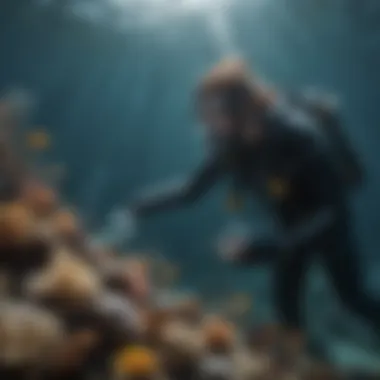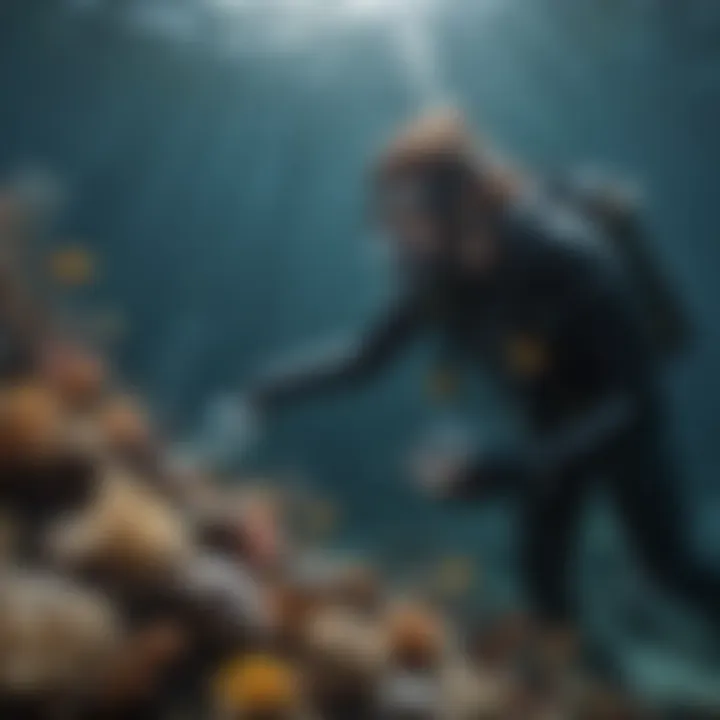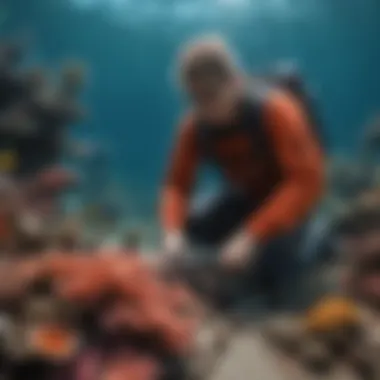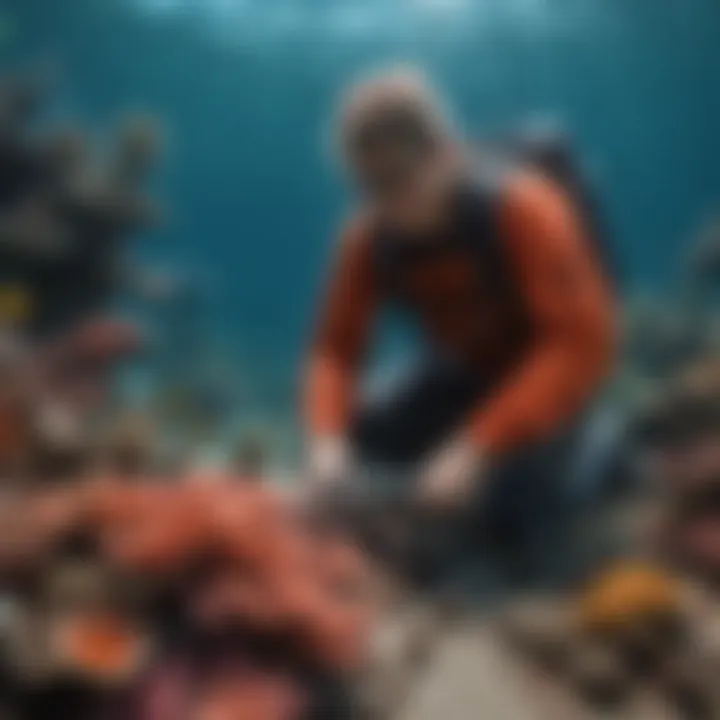Unveiling the Crucial Role of Marine Biologists in Ocean Ecosystem Conservation


Overview of the Topic
Marine biologists are an indispensable force in the realm of ocean ecosystems, intricately examining and safeguarding the delicate balance that sustains marine life. Their work extends from in-depth studies of sea creatures to meticulous evaluations of environmental impacts, all aimed at comprehending and preserving the vast and intricate web of marine ecosystems.
Current Status and Challenges
As marine environments face escalating threats from human activities and environmental changes, the role of marine biologists becomes increasingly pivotal. They confront challenges such as rising sea temperatures, overfishing, pollution, and habitat destruction, which imperil the equilibrium of ocean ecosystems. The urgent need to address these issues underscores the critical importance of marine biologists in identifying and mitigating the imminent dangers facing our seas.
Sustainable Solutions
Within the domain of marine biology, a wave of sustainable solutions and practices emerges as a beacon of hope amidst the turbulent waters of environmental degradation. Marine biologists advocate for ecosystem-based management, marine protected areas, sustainable fishing practices, and pollution control measures to restore and maintain the health of ocean ecosystems. Through the presentation of successful case studies and examples of effective resource management, they illustrate the tangible benefits of adopting sustainable approaches in safeguarding our marine resources.
Impact and Importance
The impact of marine biologists reverberates throughout ecosystems, resonating with communities and echoing into the future for generations to come. By delving into their research and conservation efforts, we unravel the intricate interplay between marine life and human activities, underscoring the profound influence of their work on fostering ecological balance and biodiversity. The significance of conservation endeavors and sustainable resource management is magnified as we recognize the irreplaceable value of our oceans and the imperative of upholding their integrity.
Preface to Marine Biology
Marine biology serves as a foundational pillar in understanding and preserving the delicate ecosystems of our oceans. This section delves into the fundamental aspects of marine biology, shedding light on its significance and the critical role it plays in environmental conservation. By examining marine organisms and their interactions with the marine environment, we gain invaluable insights into the complexities of the oceanic world. Moreover, marine biology not only enriches our knowledge of aquatic life but also aids in formulating strategies for sustainable marine resource management. Through a multidisciplinary approach, marine biology contributes to the protection and sustainable use of marine resources.
Defining Marine Biology
In essence, marine biology encompasses the scientific study of marine organisms, their behaviors, habitats, and interactions within marine environments. It involves a comprehensive investigation into various facets of marine life, ranging from microscopic plankton to majestic marine mammals. By elucidating the intricate web of marine life, marine biologists unravel the mysteries of the underwater world and develop a profound understanding of marine ecosystems' dynamics and resilience. Their research efforts not only expand our knowledge but also underpin conservation initiatives essential for preserving marine biodiversity and ecosystem balance.
Evolution of Marine Biology


The evolution of marine biology parallels humanity's exploration and understanding of the marine realm. Over the centuries, this field has transformed from a predominantly observational science to a sophisticated discipline integrating cutting-edge technologies and methodologies. Advances in marine biology have revolutionized our perception of ocean systems, enabling us to delve deeper into the complex interplay between marine organisms and their environment. Through ongoing developments and innovations, marine biologists continue to push the boundaries of knowledge, fostering a deeper appreciation for the intricate beauty and interconnectedness of marine life.
Importance of Ocean Ecosystems
Ocean ecosystems encompass a rich tapestry of living organisms and abiotic factors that collectively sustain life on Earth. These ecosystems not only harbor astonishing biodiversity but also regulate global climate patterns, sequester carbon, and provide vital ecosystem services. Understanding the importance of ocean ecosystems is paramount for safeguarding the health of our planet and ensuring a sustainable future for generations to come. Marine biologists play a pivotal role in studying and conserving these ecosystems, contributing to the preservation of biological diversity and the resilience of marine habitats.
Role of Marine Biologists
Marine biologists are the unsung heroes of ocean conservation, dedicating their lives to unraveling the complex mysteries of marine ecosystems. In this article, we delve deep into the critical role these experts play in safeguarding our oceans. By studying marine organisms, assessing environmental impacts, and conducting vital research, marine biologists offer invaluable insights into how we can better protect our marine environments. From understanding ocean dynamics to devising innovative conservation strategies, their work forms the foundation of preserving our precious seas.
Research and Data Collection
Research and data collection lie at the core of every marine biologist's work. These dedicated professionals spend countless hours gathering information on marine flora and fauna, ecosystem dynamics, and environmental changes. Through advanced research techniques such as underwater surveys, DNA analysis, and habitat mapping, marine biologists piece together the intricate puzzle of our oceans. By compiling and analyzing vast amounts of data, they gain essential knowledge that informs conservation efforts and policy decisions. Their meticulous approach to data collection ensures that decisions are based on solid scientific evidence, enhancing the effectiveness of marine conservation initiatives.
Conservation and Management Strategies
In the realm of marine biology, conservation and management strategies are paramount. Marine biologists design and implement innovative conservation plans to protect vulnerable species and habitats. Through habitat restoration projects, marine protected areas, and sustainable fishing practices, these experts strive to ensure the long-term health of our oceans. By working closely with policymakers, stakeholders, and local communities, marine biologists advocate for sustainable practices that balance human needs with environmental preservation. Their strategic approach to conservation plays a crucial role in mitigating threats to marine biodiversity and fostering ecosystem resilience.
Impact Assessment and Mitigation
Impact assessment and mitigation are crucial aspects of a marine biologist's work. By evaluating the environmental effects of human activities such as pollution, fishing, and climate change, these experts identify potential risks to marine ecosystems. Through sophisticated modeling techniques and field surveys, marine biologists quantify these impacts and propose mitigation measures to minimize harm. Whether through implementing pollution control measures, restoring degraded habitats, or promoting sustainable fisheries, their proactive approach helps to prevent irreversible damage to marine environments. By addressing threats in a timely manner, marine biologists contribute significantly to the conservation and sustainability of our oceans.
Policy Development and Advocacy
Policy development and advocacy are key focal points for marine biologists seeking to drive positive change. These professionals engage with policymakers at local, regional, and international levels to shape marine conservation policies and regulations. By providing scientific expertise, conducting impact assessments, and advocating for sustainable practices, marine biologists influence decision-making processes that impact ocean health. Through public outreach campaigns, education initiatives, and collaboration with NGOs, they raise awareness about marine conservation issues and mobilize support for environmental protection. By championing evidence-based policies and fostering stakeholder cooperation, marine biologists pave the way for a more sustainable future for our oceans.
Areas of Specialization in Marine Biology


Marine biology's realms encompass varied specializations crucial for comprehending and safeguarding ocean ecosystems. Understanding these areas is paramount for marine biologists in their mission to preserve marine life and habitats. These specializations offer unique insights into different facets of marine ecosystems, such as biodiversity, interactions, and conservation strategies. By delving into marine taxonomy, ecology, and conservation biology, researchers can unravel the complexities of ocean systems and formulate effective conservation measures.
Marine Taxonomy
Classification Systems
Classification systems in marine taxonomy serve as structured frameworks for organizing and categorizing marine organisms based on shared characteristics. These systems aid scientists in accurately identifying species, understanding evolutionary relationships, and predicting ecological roles. By utilizing classification systems, marine biologists can classify and catalog marine life efficiently, enabling clear communication and standardized documentation. However, the drawbacks lie in oversimplifying complex relationships at times and struggling to adapt to emerging discoveries, posing challenges in accurately classifying newly identified species.
Species Identification
Species identification is a fundamental aspect of marine taxonomy that focuses on discerning and classifying individual marine species. This process involves analyzing morphological, genetic, and ecological traits to differentiate one species from another accurately. Effective species identification is crucial for biodiversity assessments, conservation planning, and understanding ecosystem dynamics. Despite its significance, species identification can be labor-intensive and constrained by limited resources, hindering comprehensive surveys and potentially leading to misidentification and misinterpretation of species diversity.
Marine Ecology
Interactions in Marine Environments
Interactions in marine environments encompass the complex relationships between organisms and their surroundings, including biotic and abiotic factors. Studying these interactions provides insights into trophic dynamics, population distribution, and ecosystem stability. Understanding the intricacies of marine interactions is essential for predicting species responses to environmental changes, formulating conservation strategies, and maintaining ecosystem balance. However, the dynamic nature of interactions poses challenges in quantifying and predicting outcomes accurately, requiring continuous monitoring and adaptive management approaches.
Ecosystem Dynamics
Ecosystem dynamics in marine ecology refer to the constant changes and processes shaping marine ecosystems' structure and function. These dynamics encompass nutrient cycles, energy flow, and community interactions, influencing the resilience and adaptability of marine ecosystems. By studying ecosystem dynamics, marine biologists can assess ecosystem health, identify stressors, and implement conservation measures effectively. Despite its significance, predicting and managing ecosystem dynamics present challenges due to system complexity, nonlinear responses, and interconnected feedback loops, necessitating interdisciplinary collaborations and adaptive management strategies.
Marine Conservation Biology
Threatened Species Protection


Threatened species protection in marine conservation biology aims to mitigate risks to vulnerable marine species facing extinction threats. Conservation efforts focus on species-specific conservation plans, habitat restoration initiatives, and sustainable management practices. Protecting threatened species is essential for preserving biodiversity, ecosystem functionality, and cultural heritage. However, challenges arise in prioritizing conservation actions, allocating resources effectively, and addressing cumulative threats to multiple species simultaneously, necessitating integrated conservation approaches and stakeholder engagement.
Habitat Restoration
Habitat restoration plays a critical role in marine conservation biology by rejuvenating degraded marine habitats, recovering ecosystem functions, and enhancing biodiversity. Restoration activities involve habitat mapping, invasive species control, and habitat creation to support ecological recovery and resilience. Restoring habitats is vital for rebuilding fish populations, enhancing coastal protection, and promoting sustainable resource use. Nonetheless, habitat restoration efforts encounter challenges in securing funding, selecting appropriate techniques, and measuring restoration success, underscoring the need for adaptive restoration strategies and long-term monitoring programs.
Challenges Faced by Marine Biologists
In understanding the multifaceted domain of marine biology, one cannot skirt past the paramount significance of acknowledging the challenges that beset marine biologists in their noble quest to safeguard the oceanic ecosystems. Each challenge presents a unique obstacle, demanding innovative solutions and unwavering dedication from these experts. The trials encountered are not merely hurdles but opportunities for advancement and learning, shaping the future of marine conservation profoundly.
Pollution and Climate Change Impacts
The looming specters of pollution and climate change cast heavy shadows over the realms of marine biology. The deleterious effects of pollutants, ranging from plastics to chemical waste, on marine life are distressingly palpable. Furthermore, the escalating temperatures and ocean acidification due to climate change jeopardize the delicate balance of marine ecosystems. These dual threats not only imperil the survival of countless species but also compromise the overall health of our oceans. Marine biologists serve as sentinels, meticulously monitoring, analyzing, and combatting these adversities to safeguard the marine realm's future.
Overfishing and Habitat Destruction
The existential threats of overfishing and habitat destruction underscore the dire need for marine biologists to intervene decisively. Overexploitation of marine resources leads to disrupted food chains, depleted populations, and ecological imbalances that reverberate throughout oceanic networks. Simultaneously, habitat degradation, triggered by human activities like dredging and coastal development, erodes the fragile ecosystems that marine organisms depend upon for sustenance and shelter. Marine biologists, acting as stewards of conservation, strive to implement sustainable practices, protect vital habitats, and restore decimated areas to a semblance of their former glory.
Emerging Diseases and Invasive Species
Amid the intricate web of marine biology lies the labyrinthine challenges posed by emerging diseases and invasive species. Pathogens and diseases, spurred by environmental stressors and anthropogenic activities, threaten marine life at its core, disrupting populations and ecosystem dynamics significantly. Furthermore, the insidious encroachment of invasive species, often introduced inadvertently through human activities, poses a substantial risk to native biodiversity and ecological stability. Marine biologists, armed with scientific acumen and strategic planning, combat these insidious threats by conducting thorough research, implementing robust monitoring systems, and devising customized management strategies to mitigate the impact of these biological menaces.
Future Perspectives in Marine Biology
Future Perspectives in Marine Biology open up a realm of exciting possibilities for the marine biology field within this captivating article. As technology advances and environmental challenges evolve, focusing on Future Perspectives in Marine Biology becomes imperative. Delving into this area allows us to anticipate upcoming trends, innovative methodologies, and potential breakthroughs crucial for ocean ecosystem preservation. It serves as a compass guiding marine biologists towards sustainable practices and solutions to safeguard our precious marine environments.
Technological Advancements
Technological Advancements play a pivotal role in shaping the future of marine biology research. Under Technological Advancements, Remote Sensing emerges as a cornerstone tool revolutionizing data collection and monitoring practices. Its ability to capture detailed information from vast oceanic areas offers unparalleled insights into ecosystem dynamics. Despite its reliance on satellite technology, Remote Sensing enhances our capacity to track environmental shifts, aiding in conservation efforts tremendously. Genetic Analysis carves out another realm within Technological Advancements, providing intricate genetic insights into marine organisms. By unraveling species' genetic codes, scientists can better understand biodiversity and genetic adaptations critical for conservation strategies. Embracing Genetic Analysis empowers marine biologists to identify vulnerable species and trace population dynamics accurately. Both Remote Sensing and Genetic Analysis stand as essential aids in fortifying our understanding of marine ecosystems
Interdisciplinary Collaborations
Education and Outreach Efforts ###



